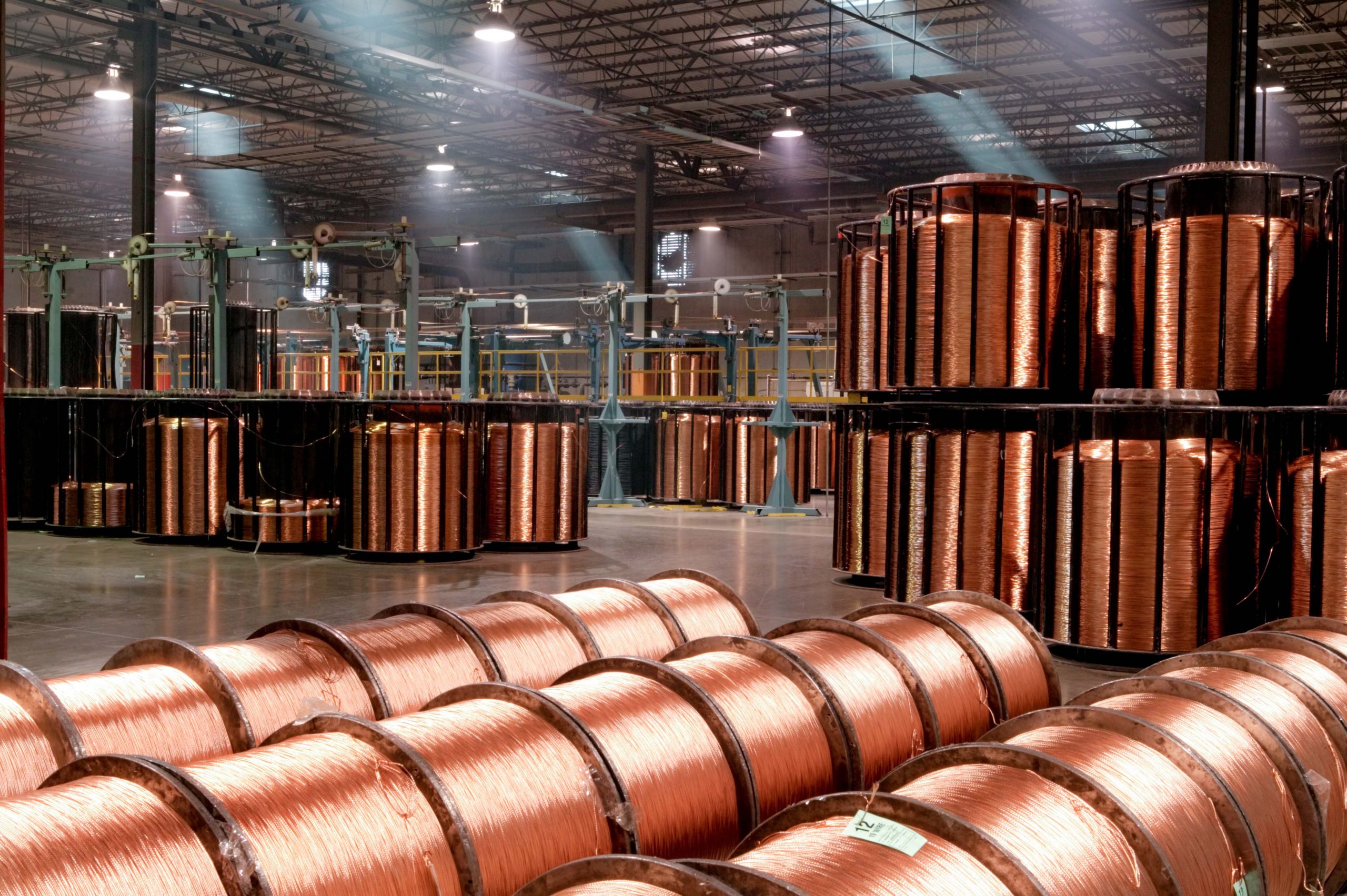Exploring the Copper Production Industry in Nigeria with Wigmore Trading
Exploring the Copper Production Industry in Nigeria with Wigmore Trading
Are you curious about how copper is produced in Nigeria? Look no further as we dive deep into the fascinating world of copper production with Wigmore Trading. Join us on this exciting journey to uncover the inner workings of the copper industry in Nigeria and learn more about how Wigmore Trading is making a mark in this booming sector. Get ready to be amazed by the process and technology behind copper production, and discover why Wigmore Trading is a key player in this dynamic industry. Let’s explore together!
Introduction to the Copper Production Industry in Nigeria
Nigeria is a country with a vast wealth of natural resources, including copper. The production of copper in Nigeria has been steadily increasing over the years, making it an important player in the global copper market. In this section, we will take a closer look at the history and current state of the copper production industry in Nigeria.
The history of copper mining in Nigeria can be traced back to more than 6,000 years ago when it was first discovered by the ancient Egyptians. However, it wasn’t until the late 1960s that commercial exploration for copper began in Nigeria. The Nigerian government saw great potential in developing its mineral resources and established several mining companies to exploit these reserves.
Today, there are two main methods of extracting copper in Nigeria: open-pit mining and underground mining. Open-pit mining involves digging large pits into the ground to extract ore deposits near the surface using heavy machinery and explosives. On the other hand, underground mining involves tunneling deep into the earth to access ore deposits that are buried deep underground.
Currently, there are several active mines producing copper in different parts of Nigeria such as Zamfara State, Kebbi State, Nasarawa State, and Cross River State. These mines produce both primary and secondary (recycled) copper products which are then sold locally or exported to other countries.
One major player in the Nigerian Copper Production Industry is Wigmore Trading Company Limited. Established in 2002 as an importer/exporter and distributor of various commodities including metals and minerals such as zinc ore concentrate and lead-ore concentrate; Wigmore Trading has now evolved into a full-fledged producer of high-grade copper cathodes through its subsidiary company – Pinnacle Metals Limited.
Pinnacle Metals Limited is one of only three companies licensed by The Ministry Of Mines And Steel Development To Produce Copper Cathode Out Of Various Grades Of Copper Ore Concentrate Locally In Nigeria For Export And Local Consumption.
The Nigerian copper production industry has faced its fair share of challenges, including issues with infrastructure, outdated mining techniques, and inconsistent government policies. However, the government has taken steps to address these challenges and create a more conducive environment for the growth of the industry.
Nigeria’s copper production industry continues to grow and contribute significantly to the country’s economy. With continued investment in modern mining techniques and supportive government policies, we can expect to see even further growth in this sector in the years to come.
Overview of Wigmore Trading and their Role in the Industry
Overview of Wigmore Trading and their Role in the Industry
Wigmore Trading is a leading player in the copper production industry in Nigeria. The company was established with the goal of revolutionizing the copper market in the country by providing high-quality products and services at competitive prices. With over 20 years of experience, Wigmore Trading has become a trusted name among customers and partners alike.
The company’s primary focus is on producing and supplying top-notch copper products to various industries such as construction, electrical, automotive, and telecommunications. They offer a wide range of copper products including wires, rods, tubes, pipes, fittings, sheets, and more. Their products are manufactured using state-of-the-art technology that ensures superior quality and consistency.
Apart from producing high-quality copper products, Wigmore Trading also offers value-added services to its customers. They have a team of experts who provide technical support to clients throughout the entire process – from product selection to delivery. This ensures that customers get exactly what they need for their specific requirements.
One of the key strengths of Wigmore Trading is their commitment to sustainability and environmental responsibility. The company follows strict guidelines for waste management and pollution control during their production process. They also promote recycling of scrap metals which helps reduce environmental impact.
With their strong presence in both local and international markets, Wigmore Trading has become one of the most preferred suppliers for large-scale projects in Nigeria. Their extensive distribution network allows them to deliver products promptly anywhere across the country.
In addition to being a prominent player in the copper production industry, Wigmore Trading also plays an essential role in promoting economic growth in Nigeria. The company provides employment opportunities to hundreds of people directly or indirectly through its supply chain network. It also contributes significantly to government revenue through taxes and other levies.
As part of its corporate social responsibility efforts, Wigmore Trading regularly engages with local communities by supporting educational initiatives and participating in charitable activities. This reflects the company’s commitment to making a positive impact on society.
Wigmore Trading has established itself as a leader in the copper production industry in Nigeria through its dedication to quality, sustainability, and community engagement. As the demand for copper continues to rise in various industries, Wigmore Trading is well-positioned to meet the growing needs of its customers while also contributing to the country’s economic development.
History of Copper Production in Nigeria
The history of copper production in Nigeria dates back to the pre-colonial era, with evidence of early copper smelting and mining activities found in the Nok culture. The Nok people, who lived in what is now known as central Nigeria, were skilled metallurgists and used copper to create intricate bronze sculptures.
However, it was not until the 20th century that large-scale commercial copper mining began in Nigeria. In 1905, a British company named Royal Niger Company (RNC) discovered significant copper deposits near Jos, Plateau State. This discovery led to the establishment of a small-scale mining operation by RNC, which later became known as the Jos Plateau Tin Mining Company (JPTMC).
The JPTMC operated for several decades until World War II when copper prices soared due to increased demand for weaponry and ammunition. This resulted in a rush for copper exploration and production in various parts of Nigeria. As a result, several other companies joined JPTMC in extracting and exporting copper from Nigeria.
In 1958, the Nigerian government identified copper as one of its key minerals for exportation and enacted legislation to regulate its production and trade. This led to the formation of the Nigerian Mining Corporation (NMC), which took over most of JPTMC’s operations.
During this period, there was also an increase in artisanal mining activity as local communities began utilizing their traditional knowledge to extract small quantities of copper from surface mines or shallow pits. However, this method was inefficient compared to modern techniques used by larger mining companies.
In the late 1970s and early 1980s, Nigeria experienced a decline in its mining sector due to economic recession and political instability. Many foreign companies pulled out of the country during this time, resulting in decreased investment and production levels.
But with increased stability after political transitions in the late 1990s and early 2000s, there was a renewed interest in Nigeria’s copper resources. The government embarked on efforts to revitalize the mining sector, and new companies such as Kilembe Mines Limited and Sapele Mines joined the industry.
Today, Nigeria is still one of the leading producers of copper in Africa, with several large-scale mining operations owned by both local and international companies. These include First Quantum Minerals’ Kansanshi Mine, Glencore’s Mopani Copper Mines, and Barrick Gold’s Lumwana Mine.
Although the history of copper production in Nigeria has had its ups and downs, it remains a significant contributor to the country’s economy. With continued investments and advancements in technology, there is great potential for further growth in this industry.
Current State of the Copper Production Industry in Nigeria
The copper production industry in Nigeria is currently facing a number of challenges, but also holds enormous potential for growth and development. With the country being one of the top mineral-rich nations in Africa, it comes as no surprise that copper production has been a significant contributor to its economy.
However, in recent years, the industry has seen a decline in production and investment due to various factors such as inadequate infrastructure, lack of technological advancements, and political instability. As a result, Nigeria’s share in global copper production has significantly decreased from 0.9% in 2010 to only 0.2% in 2021.
One of the main challenges faced by the industry is the limited infrastructure for exploration and extraction of copper deposits. Most of the mines are located in remote areas with poor road networks and limited access to electricity and water supply. This makes it difficult for mining companies to operate efficiently and increases their overall costs.
Moreover, there is a lack of modern technology used in the extraction process which leads to low productivity and high wastage rates. This not only affects profitability but also harms the environment through pollution caused by inefficient methods.
Additionally, political instability and insecurity have also posed a threat to the industry’s growth prospects. The continuous rise of militant activities in some parts of the country has led to disruptions in mining operations. This has resulted in loss of revenue for both mine owners and government royalties.
Despite these challenges, there are still promising opportunities for growth within the Nigerian copper production industry. The government has shown commitment towards revitalizing this sector by implementing policies that attract foreign direct investments (FDIs) into mining projects.
In recent years, international companies such as First Quantum Minerals Ltd., Rio Tinto Group, Glencore Plc., among others have shown interest in investing in Nigeria’s copper reserves. Their involvement is expected to bring much-needed expertise, advanced technology, and capital into developing sustainable mining practices.
Furthermore
Challenges Faced by the Industry and How Wigmore Trading is Addressing Them
The copper production industry in Nigeria has faced numerous challenges over the years, hindering its growth and development. Some of the main challenges include inadequate infrastructure, limited access to capital, and unreliable power supply.
Infrastructure plays a crucial role in any industry’s success, and the copper production industry is no exception. Inadequate transportation systems make it difficult to transport raw materials and finished products, leading to delays in production timelines. This can result in increased costs and reduced profitability for companies operating within the industry.
Another major challenge faced by the copper production industry is limited access to capital. Many businesses within this sector struggle to secure financing for their operations due to strict lending policies from financial institutions. This lack of access to funding makes it challenging for companies to invest in modern equipment or expand their operations, which ultimately affects their productivity and competitiveness.
One of the critical requirements for successful copper production is a reliable power supply. However, Nigeria’s electricity supply remains largely unstable, with frequent power outages that disrupt production processes. Companies are forced to rely on expensive alternative sources of energy such as generators, which significantly impact their operational costs.
In response to these challenges facing the industry, Wigmore Trading has implemented various strategies aimed at addressing them. Firstly, we have invested heavily in our own transportation fleet, ensuring timely delivery of raw materials and finished products for our clients. By maintaining control over our logistics processes, we can mitigate delays caused by inadequate infrastructure.
Moreover, Wigmore Trading has also developed strong relationships with different financial institutions and government bodies that provide funding opportunities for businesses within the copper production industry. Through these partnerships, we assist our clients in securing financing options that best suit their needs.
To tackle the issue of unreliable power supply, Wigmore Trading has invested in renewable energy systems such as solar panels at our manufacturing facilities across Nigeria. This allows us to reduce our dependence on traditional forms of energy while also promoting sustainable practices within the industry.
The copper production industry in Nigeria faces several challenges, but Wigmore Trading is committed to addressing them through strategic investments and partnerships. We believe that by overcoming these obstacles, we can contribute to the growth and development of the industry while providing high-quality copper products to our clients.
Impact of Copper Production on the Nigerian Economy
The copper production industry in Nigeria has had a significant impact on the country’s economy. Copper, which is a highly valuable and versatile metal, plays a crucial role in various industries such as construction, electronics, and transportation. As one of the leading copper producers in Africa, Nigeria has experienced both positive and negative effects from its copper production.
One of the main impacts of copper production on the Nigerian economy is its contribution to the country’s GDP (Gross Domestic Product). According to data from the Nigerian Bureau of Statistics, mining and quarrying activities, which include copper production, accounted for 9.8% of Nigeria’s GDP in 2020 alone. This demonstrates the significant role that copper production plays in driving economic growth and development in the country.
Furthermore, the copper industry has also been responsible for generating employment opportunities for thousands of Nigerians. From miners to engineers and technicians to support staff such as drivers and cleaners – all are essential parts of the supply chain required for successful copper production. The mining sector employs about 1 million people directly and indirectly across different regions in Nigeria. These jobs provide income for individuals and their families, thereby improving their standard of living.
Copper production has also contributed significantly to government revenue through taxes and royalties paid by mining companies operating within Nigeria. This revenue is then used to fund critical sectors such as education, healthcare, infrastructure development among others – ultimately benefitting citizens across all socio-economic classes.
However, there have also been some adverse effects associated with copper production on the Nigerian economy. One notable consequence is environmental degradation caused by mining activities. The extraction process involves digging up large areas of land which can lead to deforestation and soil erosion if not carried out properly.
Moreover, mining produces waste materials that can pollute water sources if not disposed responsibly. In addition to this, chemicals used during processing can contaminate surrounding soil or air if adequate measures are not put into place to prevent their release. These environmental impacts can have long-term consequences on the health and well-being of both humans and wildlife in the affected areas.
It is undeniable that copper production has had a significant impact on the Nigerian economy. While it has contributed to economic growth, provided employment opportunities, and generated government revenue, there is also a need for sustainable practices to mitigate its negative effects on the environment. As Nigeria continues to expand its copper production industry, it is crucial that proper regulations and measures are put into place to ensure responsible mining practices for the benefit of all stakeholders involved.
Sustainable Practices and Future Outlook for Copper Production in Nigeria with Wigmore Trading
Sustainable Practices and Future Outlook for Copper Production in Nigeria with Wigmore Trading
In recent years, there has been a growing global demand for sustainably produced materials, including copper. As the mining industry continues to face scrutiny over its environmental impact, it is essential that companies adopt sustainable practices to ensure the long-term viability of their operations. In this section, we will discuss the sustainable practices implemented by Wigmore Trading in their copper production process and their future outlook for the industry.
Wigmore Trading recognizes the importance of responsible mining and has taken significant steps towards reducing its environmental footprint. For instance, they have invested in modern technology and equipment to minimize energy consumption and reduce emissions from their operations. They have also implemented water management strategies to conserve this valuable resource in an already water-stressed region.
Furthermore, Wigmore Trading prioritizes the health and safety of its employees by providing them with proper training on safe mining practices and regularly conducting safety audits. They also prioritize local hiring and sourcing of materials to support the community and contribute to economic growth.
Another crucial aspect of sustainable copper production is mitigating social impacts on nearby communities. Wigmore Trading works closely with local authorities and community leaders to identify potential concerns early on, address them promptly, and build strong relationships based on mutual trust.
In addition to these efforts, Wigmore Trading is committed to minimizing waste generation through recycling initiatives and reusing resources whenever possible. This not only reduces their carbon footprint but also helps cut down production costs.
Looking forward, Wigmore Trading sees great potential for growth in the Nigerian copper industry while maintaining a focus on sustainability. With advancements in technology such as automated processes and renewable energy sources becoming more accessible, they believe it is possible to increase production while minimizing environmental impact.
Moreover, as global demand for clean energy solutions continues to rise, so does the demand for copper used in renewable energy technologies like solar panels and wind turbines. This presents an excellent opportunity for Wigmore Trading to expand its production and contribute to the sustainable development of Nigeria’s energy sector.
Sustainable practices are essential for the long-term success of any industry, including copper production. By prioritizing responsible mining practices and continuously seeking innovative solutions, Wigmore Trading is leading the way towards a more sustainable future for copper production in Nigeria.
Conclusion: The Importance of Investing in the Nigerian Copper Industry with Wig
Conclusion: The Importance of Investing in the Nigerian Copper Industry with Wigmore Trading
Investing in the Nigerian copper industry with Wigmore Trading is a wise and profitable decision. As we have explored in this article, Nigeria has a rich reserve of copper ore and a favorable business climate for mining companies. With the support of Wigmore Trading’s expertise and resources, it presents a golden opportunity for investors to tap into this thriving market.
The demand for copper continues to rise globally due to its versatile use in various industries such as construction, electronics, transportation, and renewable energy. This presents an excellent opportunity for investors to enter the Nigerian market at an ideal time when the demand for copper is high.
Wigmore Trading offers a complete range of services that cater to all stages of the copper production process. From exploration and mining to processing and exportation, their team of experts ensures efficient operations from start to finish. They also provide essential services such as consulting, financial assistance, and logistics support to ensure smooth operations.
Investing in Nigeria’s copper industry not only brings financial benefits but also contributes positively to the country’s economic growth. The revenue generated from these investments creates job opportunities and boosts local communities’ development where mining activities take place.
Moreover, Wigmore Trading is committed to sustainable practices that prioritize environmental responsibility while maximizing profits. Their state-of-the-art facilities adhere to international standards and follow strict safety protocols.
Investing in any industry comes with risks; however, with Wigmore Trading’s well-established presence in Nigeria’s mining sector, these risks are significantly reduced. Their strong relationships with local authorities and knowledge about government policies make them a reliable partner for investors looking to venture into the country’s copper industry.
Investing in Nigeria’s copper industry with Wigmore Trading provides many advantages – access to abundant reserves of high-quality ore, increased global demand for copper products, comprehensive services provided by experienced professionals, positive impact on local communities, and a trusted partner. These factors combine to make Nigeria’s copper industry a promising investment opportunity that investors should not overlook.
We hope this article has shed light on the potential of the Nigerian copper industry and how Wigmore Trading can help interested investors achieve success in this field. With their support, investing in the Nigerian copper industry will undoubtedly bring fruitful returns for years to come. So why wait? Contact Wigmore Trading today and seize the opportunity to be part of this growing sector.








Comments are closed.